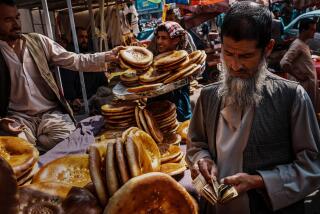In Afghanistan, a long-delayed national talk
- Share via
Reporting from Kabul, Afghanistan — — In the cavernous tent where Afghan President Hamid Karzai is to convene a grand tribal gathering this week, rows of chairs sit empty, waiting for turbaned elders to fill them. A youth orchestra tunes up, ready to rehearse a stirring national song. The broad street that leads to the complex echoes with the din of last-minute roadwork.
After repeated delays, Afghanistan’s much-touted “national consultative peace jirga,” intended to chart a course for any future political engagement with the insurgent Taliban, finally appears on track to take place. But most observers’ expectations are low, centered more on damage control than on the possibility of a workable blueprint toward peace emerging from talks among 1,600 delegates.
Karzai unveiled plans for the gathering nearly seven months ago, as he was being inaugurated for a second term in office after a divisive, fraud-tainted election. His aides, together with many of his Western backers, hoped that convening a jirga — traditionally an important conflict-resolution mechanism in Afghanistan’s tribal society — would help bolster his legitimacy.
Now the Karzai administration is distancing itself from the notion that the president needs a mandate for dealings with the insurgency — or anything else, for that matter. And any concrete measures approved by the jirga would be mainly symbolic because they would probably require a parliamentary vote to take effect.
Among ordinary Afghans, there is little sense of excitement surrounding the event, despite billboards all over town — emblazoned with an outdated timetable. Along city streets where military convoys rumble by, amateurishly drawn jirga posters feature a map of Afghanistan, superimposed with a dove of peace.
Rather than anticipation, the prevailing public sentiment seems to be nervousness over the possibility that the jirga, like any large, high-profile gathering anywhere in Afghanistan these days, could prove a magnet for insurgent attacks.
Security is expected to be extremely tight, but Taliban suicide bombers and other assailants have proved adept at penetrating even heavily fortified parts of the capital. Police in Kabul reported the discovery this month of a cache of rockets they suspected might have been earmarked for a strike against the gathering.
Such concerns aside, American officials will be watching closely. One major reason that Karzai visited Washington recently — other than to patch up a highly publicized rift between him and the Obama administration — was so that U.S. officials could gauge the Afghan president’s intentions regarding efforts at reconciliation with the Taliban.
The United States and other Western players in Afghanistan support the idea of using financial incentives and other means to woo Taliban foot soldiers away from the fight, but are considerably warier of the prospect of the Afghan government attempting to engage the movement’s top leadership.
Karzai has promised not to talk with anyone who has not renounced violence and ties to groups such as Al Qaeda, or who has failed to pledge to respect Afghanistan’s Constitution.
But some women’s rights activists are worried that hard-won constitutional protections for them could eventually be sacrificed in a bid to court the Taliban, a process that could be set in motion at the jirga. Secretary of State Hillary Rodham Clinton this month warned against making any such concessions as a sweetener for negotiations.
Advocacy groups representing victims of violence are also concerned, fearful that a political settlement with insurgents could wind up providing a blanket amnesty for past atrocities. One such organization recently held a mini-jirga of its own in protest.
Questions have also been raised as to whether the jirga, although large to the point of unwieldiness, will represent a true cross-section of Afghan society. Karzai’s spokesman Waheed Omar, speaking to journalists last week, insisted that the voices of “every class and caste of people” would be heard.
Karzai’s critics, however, say the jirga is meaningless because it will not include a sufficiently broad spectrum of political views. No representatives of the insurgency are expected to be present, but also absent will be many of the president’s more mainstream rivals.
“Nobody invited us,” said Ali Jan, a spokesman for Abdullah Abdullah, who was Karzai’s main challenger in the presidential race.
Relations remain tense as well between Karzai and parliament, which in recent months has been unexpectedly robust in challenging the Afghan leader’s actions and policies. The latest dispute between Karzai and lawmakers, some of whom are slated to participate in the jirga, revolves around delays in the president putting forth nominees for vacant Cabinet posts.
The sour tone of the Afghan leader’s dealings with parliament could presage trouble if he seeks lawmakers’ endorsement of any sweeping peace plan.
Some analysts have suggested that regardless of the jirga’s outcome, the Taliban leadership has little incentive to come to the bargaining table because it is still unclear whether an ongoing U.S. troop surge will break the insurgency’s battlefield momentum.
Masood Farivar, who heads Afghanistan’s largest independent radio network, said the gathering was in some ways reminiscent of jirgas organized by the country’s communist regime in the 1980s.
“They were a disaster, and they clearly didn’t lead to peace and reconciliation with the mujahedin,” he said. “Even if some kind of road map emerges for talks with the opposition, whether the Taliban will respond is an open question.”
More to Read
Sign up for Essential California
The most important California stories and recommendations in your inbox every morning.
You may occasionally receive promotional content from the Los Angeles Times.










